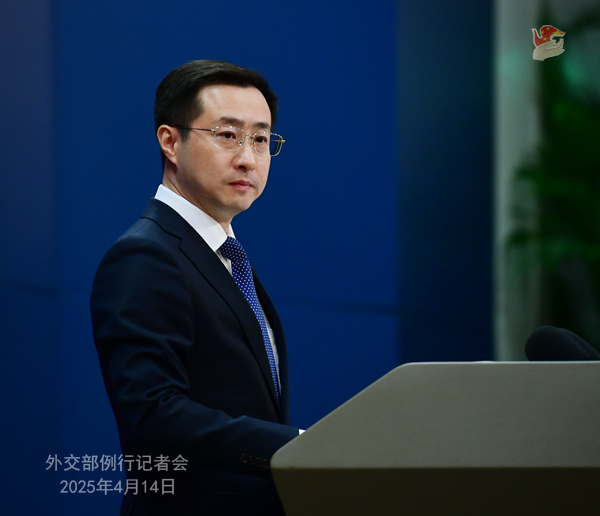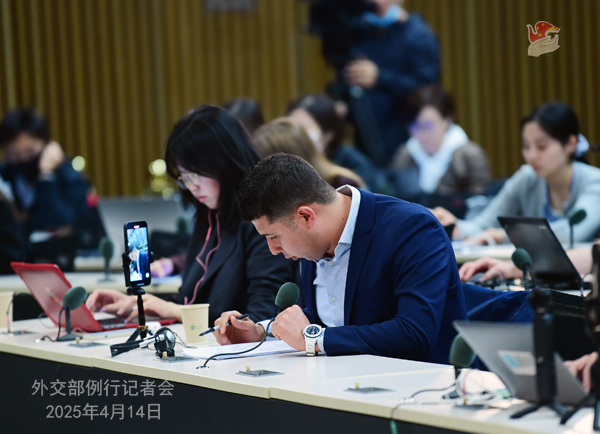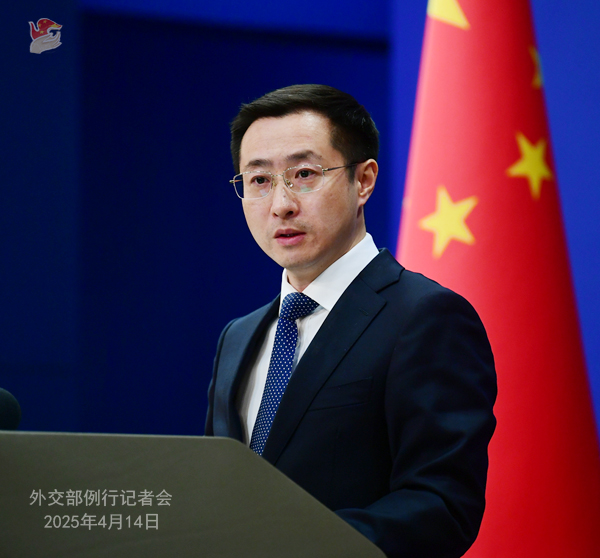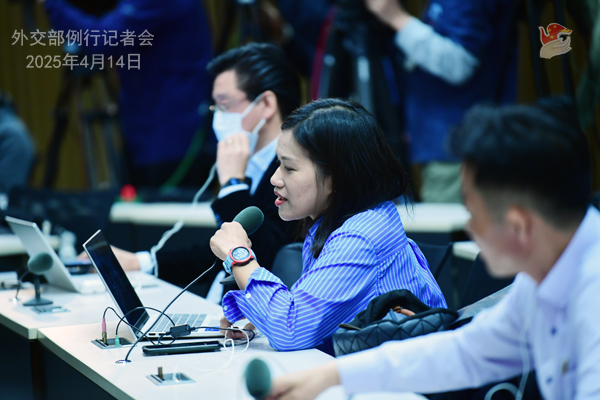
CCTV: The world is closely following the devastating impact of the Trump administration’s tariff hikes on other countries. As two major economies in the world, China and the EU have recently had quite a lot of high-level exchanges. Could you share with us the communication and coordination between China and the EU on additional U.S. tariffs?
Lin Jian: The U.S. uses tariff as a weapon to exert maximum pressure and seek selfish gains, and puts its own interests over the public good of the international community. This is a typical move of unilateralism, protectionism and economic bullying, which severely hurts the interests of China, the EU and the rest of the world.
As the second and third largest economies, China and the EU collectively account for over one third of the global economy and more than a quarter of global trade. Both sides are advocates of economic globalization and trade liberalization, and firm defenders and supporters of the WTO. The head of the EU underscored the vital importance of stability and certainty for a sound global economy. China and the EU are committed to a fair, free and WTO-centered multilateral trading system, and the sound and steady development of global trade and economic relations, which is in the interest of both sides and the rest of the world.
As a responsible major country, China has already taken resolute measures and will continue to do so to safeguard its legitimate interests. China stands ready to work with the international community, including the EU, to step up communication and coordination, share development opportunities, expand opening up and cooperation, and achieve mutual benefits. We will not only safeguard respective interests, but also defend international trade rules, fairness and justice.
China-Arab TV: The U.S. kept changing its tariffs policy and for now granted exemption on part of Chinese imports. What’s China’s view? Will China cut tariffs correspondingly?
Lin Jian: The spokesperson of the Ministry of Commerce has made clear China’s view on this. Facts have shown and will continue to show that there are no winners in a trade war or a tariff war and protectionism will lead nowhere. The tariff tsunami hurts the U.S. itself as well as other countries. We urge the U.S. to quit maximum pressure and resolve issues through dialogue on the basis of equality, respect and mutual benefit.

China News Service: Foreign Ministry Spokesperson recently said China will take firm countermeasures against the U.S.’s additional visa restrictions on Chinese officials determined to be substantially involved in the formulation or execution of policies related to access for foreigners to “Tibetan Areas.” Could you share more details on these countermeasures?
Lin Jian: Xizang affairs are purely China’s internal affairs. The U.S.’s arbitrary visa restrictions on Chinese officials under the pretext of the Xizang-related issues violate international law and basic norms governing international relations. In accordance with the Law on Foreign Relations of the People’s Republic of China and the Anti-Foreign Sanctions Law of the People’s Republic of China, China decided to impose visa restrictions on U.S. personnel who have acted egregiously on the Xizang-related issues.
Xizang is an open region. We welcome friends from foreign countries to visit, travel and do business in China’s Xizang region. At the same time, we oppose any country or individual using human rights, religion and culture as a false pretext to meddle in Xizang affairs. We oppose interference and sabotage by people with ill motives who would use visits to Xizang as an opportunity to engage in such activities.
Antara: Indonesia and China celebrated the 75th anniversary of the establishment of diplomatic relations yesterday on April 13th. In his exchange of congratulatory messages with President Prabowo Subianto, the Chinese leader stated that we should enrich the China-Indonesia community with a shared future and it serves as a model of solidarity between major developing countries. My question is, amid the current complex and turbulent international landscape, what opportunities can be further explored to deepen cooperation between the two countries?
Lin Jian: Yesterday marked the 75th anniversary of diplomatic ties between China and Indonesia. President Xi Jinping and President Prabowo Subianto exchanged congratulatory messages, spoke highly the development of bilateral ties, and stressed that they will firmly support each other’s national development outlook, jointly advance along our respective modernization path, and lead the relationship to new heights. We have full confidence in a better future of the growth of China-Indonesia relations.
Both China and Indonesia are major developing countries and important forces in the Global South. The cooperation between the two countries has strategic significance and global influence. Amid increasing turbulence in the international landscape, the all-round strategic cooperation between China and Indonesia is all the more important. As we celebrate the 75th anniversary of our diplomatic ties, China stands ready to work with Indonesia to jointly uphold regional development, prosperity and stability, work for closer coordination between major countries in response to global challenges, keep the multilateral trading system and industrial and supply chains stable and smooth, and demonstrate the influence of China-Indonesia community with a shared future in the region and the world at large.
China Daily: In his remarks at the 2025 Central American Security Conference in Panama City, U.S. Defense Secretary Pete Hegseth blatantly peddled the “China threat” narrative and made aggressive remarks on China’s military and companies. He said the U.S. must prevent war by robustly and vigorously deterring China’s threats in the Western Hemisphere. Deputy Secretary Landau made clear to El Salvador the importance of collaboration on 5G, cybersecurity, and AI, and stressed the need to prevent China from accessing it by only allowing trusted vendors. What’s China’s comment?
Lin Jian: The remarks of relevant U.S. officials are steeped in ideological bias and the Cold War mentality. There is not a single word of truth in them. Who sees Latin America and the Caribbean as a backyard and forces the “Neo-Monroe Doctrine” on them? Who keeps pointing fingers at the domestic affairs of these countries? Who’s been coercing them with tariff threats? Who’s engaged in massive global surveillance? Who’s got military bases all over the Western Hemisphere? Who’s letting small arms and light weapons and ammunition flow into Latin America and the Caribbean as a Zone of Peace? The world knows full well the answer to these questions.
China’s cooperation with Latin American and Caribbean countries is South-South cooperation. It is always aimed at giving each other support and never driven by geopolitical calculations. China is committed to equality and mutual benefit in engaging with these countries and never seeks sphere of influence or targets any third party. The U.S. keeps vilifying China and peddling the so-called “China threat” in order to cook up a pretext to justify their action to control countries in this region, yet they will never succeed.
AFP: Russia launched a missile attack against the Sumy region in Ukraine yesterday. U.S. President Donald Trump called it “terrible” while other leaders have also condemned that. What’s China’s response?
Lin Jian: China’s stance on the Ukraine crisis is consistent and clear. Dialogue and negotiation is the only way out of the crisis.
AFP: The UK government this weekend said that it was taking control of British Steel from the Chinese company Jingye. The UK’s Business Secretary Jonathan Reynolds also said that it was “naive” for Britain to allow the steel industry to fall into Chinese hands. Does the Foreign Ministry have a comment on the takeover and then also on the Business Secretary’s comments on the deal?
Lin Jian: As I understand, the Jingye Group you mentioned is a private Chinese enterprise that has business cooperation with the UK side on the basis of market principles. As for the current difficulties arising in the operation of British Steel, the two sides should resolve them through consultations in the principle of mutual benefit. We hope that the British government will treat Chinese companies investing and operating in the UK in a fair and just manner, protect their legitimate rights and interests, and refrain from turning economic and trade cooperation into political and security issues lest it should undermine the confidence of Chinese companies in their normal investment and operation in the UK.

Shenzhen TV: Last week, Spanish Prime Minister Pedro Sánchez visited China, which received extensive and close attention. When speaking to the press during the trip, he noted that the aim of the visit is to consolidate Spain’s relations with China and enhance dialogue and cooperation with China. He also stressed that Spain and the EU support free trade and stand ready to work with China to address global challenges. What’s your comment on the visit by Prime Minister Sánchez?
Lin Jian: This is Prime Minister Sánchez’s third visit to China within three years. The visit is a great success and demonstrates the firm willingness and determination of China and Spain to further grow the bilateral ties. During the visit, President Xi Jinping met with Prime Minister Sánchez and Premier Li Qiang had talks with him. Leaders of the two countries had friendly and in-depth exchanges of views. The two sides jointly issued the Action Plan for Strengthening the Comprehensive Strategic Partnership, and proposed to build a more strategically resilient and dynamic comprehensive strategic partnership, to better serve the well-being of both peoples, inject impetus into China-EU relations, and make greater contributions to world peace, stability, and development.
Leaders of the two countries had in-depth and strategic communication on the growth of bilateral relations. They agreed to continue to respect and support each other. Spain reaffirmed its commitment to the one-China principle. They stressed the importance of leveraging their complementarity in cooperation, strengthening cooperation in trade, investment and other traditional areas, and tapping the potential in emerging areas like new energy, artificial intelligence and digital economy. They underscored the need to explore the rich historical heritage of the two ancient civilizations, give a stronger boost to cooperation in such areas as culture, education, youth exchange and tourism, and carry forward the deep bond between the two peoples fostered through the Olympics and panda cooperation.
They also exchanged views on China-EU relations, and international and regional issues of mutual interest. They stressed the need to boost the steady development of China-EU relations, and stay committed as each other’s partner for mutually beneficial cooperation. Both China and Spain are positive supporters of multilateralism and open cooperation. It is important for the two sides to uphold free trade and steady global economic order.
President Xi Jinping noted that as the international situation gets more complex and volatile, it is increasingly important for China and Spain to develop sound and stable relations. China stands ready to work with the international community, including Spain, to firmly stand on the right side of history, be a firm defender of multilateralism, international order and rules, firmly oppose unilateralism and protectionism, jointly pursue openness and cooperation, defend the common interests of the international community and provide more confidence and driving force for world development and prosperity.
AFP: The UK’s Foreign Secretary David Lammy said that he was deeply concerned after a British Member of Parliament was denied entry to Hong Kong last week. He said he would raise the issue with the Chinese authorities. I just wonder if the Foreign Ministry could say why this MP was denied entry or provide any more details. And also what’s the Ministry’s response to the UK Foreign Secretary’s concerns?
Lin Jian: The Hong Kong SAR government has stated its position on that. Let me stress that border entry is a matter within a country’s sovereignty. The Hong Kong SAR government has the authority to handle individual cases of entry in accordance with relevant laws and policies.
